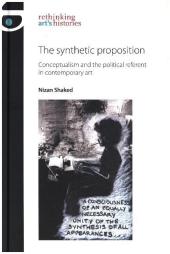 Neuerscheinungen 2017Stand: 2020-02-01 |
Schnellsuche
ISBN/Stichwort/Autor
|
Herderstraße 10
10625 Berlin
Tel.: 030 315 714 16
Fax 030 315 714 14
info@buchspektrum.de |

Nizan Shaked
The synthetic proposition
Conceptualism and the political referent in contemporary art
2017. 304 S. 246 mm
Verlag/Jahr: MANCHESTER UNIVERSITY PRESS 2017
ISBN: 1-78499-275-5 (1784992755)
Neue ISBN: 978-1-78499-275-0 (9781784992750)
Preis und Lieferzeit: Bitte klicken
Traces two intersecting trajectories in American art. It shows how rights-based 1960s politics and the identity politics of the 1970s influenced the development of Conceptual art (with a capital ´C´) into the diverse set of practices generally characterised as conceptualist (with a lower-case ´c´).
The synthetic proposition examines the impact of Civil Rights, Black Power, the student, feminist and sexual-liberty movements on conceptualism and its legacies in the United States between the late 1960s and the 1990s. It focuses on the turn to political reference in practices originally concerned with abstract ideas, as articulated by Joseph Kosuth, and traces key strategies in contemporary art to the reciprocal influences of conceptualism and identity politics: movements that have so far been historicised as mutually exclusive. The book demonstrates that while identity-based strategies were particular, their impact spread far beyond the individuals or communities that originated them. It offers a study of Adrian Piper, David Hammons, Renée Green, Mary Kelly, Martha Rosler, Silvia Kolbowski, Daniel Joseph Martinez, Lorna Simpson, Hans Haacke, Andrea Fraser and Charles Gaines. By turning to social issues, these artists analysed the conventions of language, photography, moving image, installation and display.
Introduction
1. Conceptual Art and identity politics: from the 1960s to the 1990s
2. Adrian Piper: the body after conceptualism
3. The synthetic proposition: conceptualism as political art
4. The political referent in debate: identity, difference, representation
5. Institutional gender: from Hans Haackes Systems Theory to Andrea Frasers feminist economies
A state of passionate detachment: Charles Gaines by way of conclusion
Index


